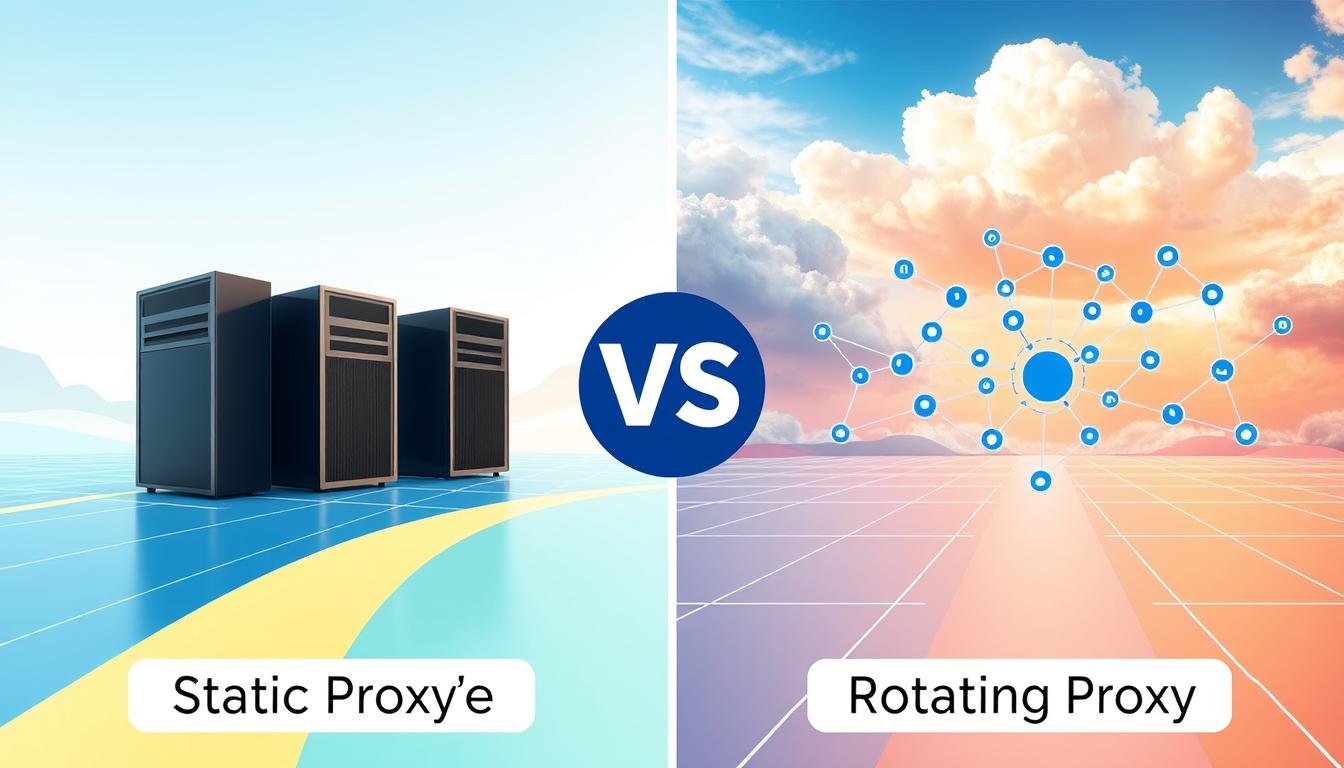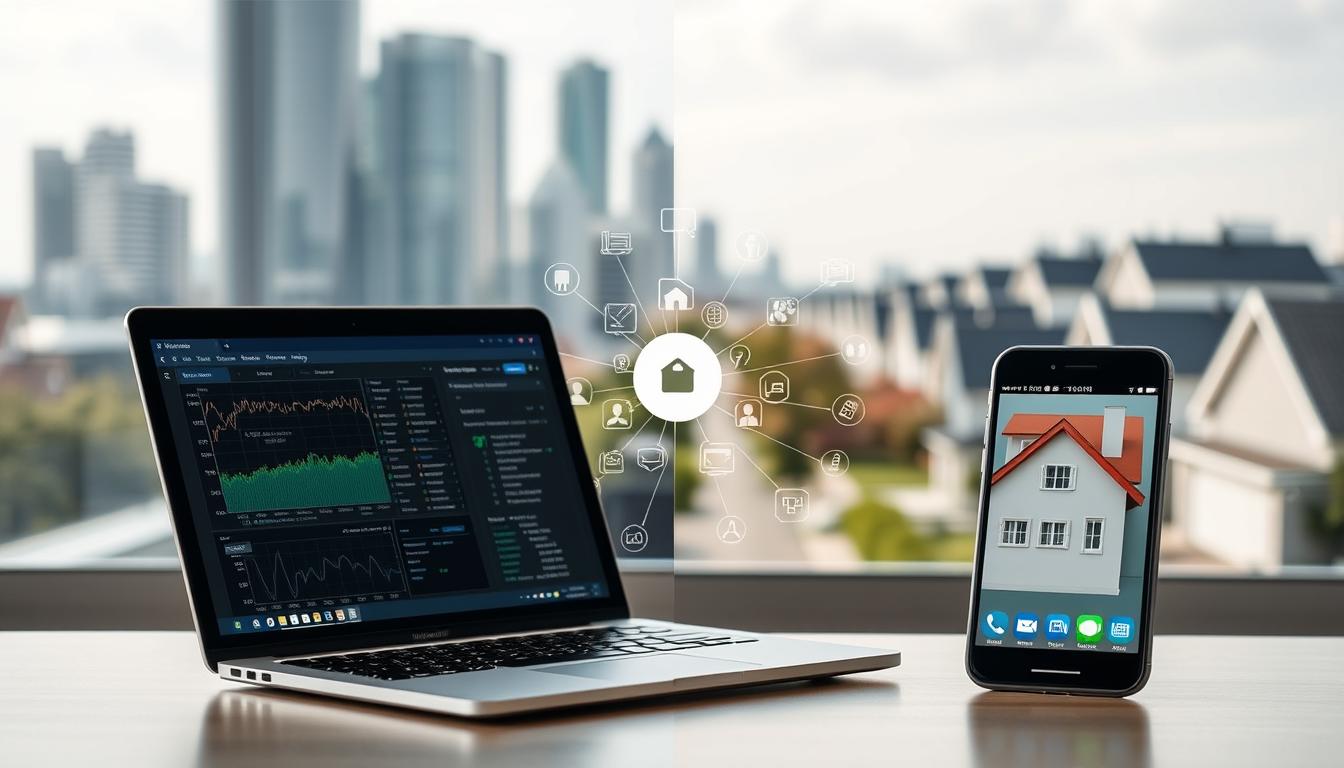FTC disclaimer: This post contains affiliate links and I will be compensated if you make a purchase after clicking on my link.
Are you having trouble managing your healthcare practice? Do you want to build stronger patient relationships? The right healthcare CRM software can help a lot. It makes your work easier and improves how patients feel.
But, with so many choices, picking the best one can be hard. Our list of the 13 best healthcare CRM software can help. Find the perfect fit for your medical practice here.
Key Takeaways
- Healthcare CRM software helps manage patient relationships, streamline processes, and improve operational efficiency.
- The best healthcare CRM solutions offer features like patient data management, appointment scheduling, and HIPAA compliance.
- Pricing for healthcare CRM software can range from $12/month to $300/month, with options to suit various budget needs.
- Salesforce Health Cloud, Zoho CRM, and Microsoft Dynamics 365 are among the top-rated healthcare CRM software.
- Choosing the right CRM for your healthcare practice requires considering factors like budget, integration with existing systems, and user-friendliness.
What is Healthcare CRM Software?
Healthcare Customer Relationship Management (CRM) software helps manage patient relationships. It makes operations more efficient and improves care. It keeps patient data in one place, automates tasks, and boosts communication.
Definition and Purpose
Healthcare CRM software gives a full view of patient habits. It uses data from many sources like demographics and medical records. Its main goal is to offer personalized care, engage patients better, and work more efficiently.
Key Features to Consider
- Patient data management: Keeps patient info, like medical history and contact details, in one spot.
- Appointment scheduling: Automates scheduling and sends reminders to keep patients on track.
- Billing integration: Works well with billing systems for better financial management.
- HIPAA compliance: Ensures patient data is safe and private.
These features help improve patient care and make operations smoother. They help healthcare groups make better choices for their patients.
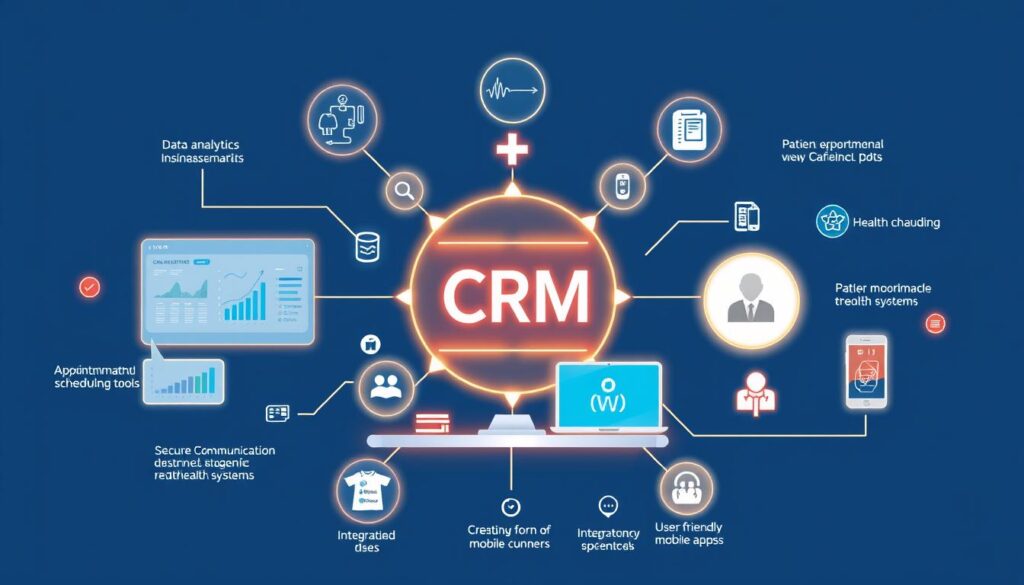
Benefits of Using CRM in Healthcare
Healthcare CRM software brings many benefits. It helps improve patient relationships and makes operations smoother. It also helps manage data better. This leads to better care and more efficient work.
Improved Patient Relationships
CRM systems in healthcare make communication and care plans more personal. They help build stronger bonds between patients and their doctors. Doctors can understand each patient’s needs and history better, offering more tailored care.
Streamlined Operations
Healthcare CRM software makes tasks like appointment scheduling and HIPAA-compliant communication easier. It automates workflows and sends reminders. This lets doctors focus more on caring for patients and less on paperwork.
Enhanced Data Management
CRM systems in healthcare offer a central place for patient data. They ensure data is safe and easy to find. This helps doctors make better decisions and improve care coordination, leading to better patient outcomes.

Using CRM software can change how healthcare works. It strengthens patient relationships and helps make decisions based on data. This leads to better performance and happier patients.
Top Healthcare CRM Software Options
Choosing the right Customer Relationship Management (CRM) software is key for managing patient relationships and improving healthcare operations. The healthcare field has special needs, like following HIPAA rules and working together with many providers. Luckily, there are top CRM solutions made just for healthcare.
Comprehensive Overview
Platforms like Salesforce Health Cloud and Zoho CRM are leaders in the healthcare CRM world. They offer more than just basic contact management. They have strong tools for Care Coordination, patient engagement, and Revenue Cycle Management.
Key Features Comparison
- HIPAA-compliant data management and security
- Streamlined appointment scheduling and patient intake
- Integrated electronic health record (EHR) and practice management systems
- Automated workflow and task management for improved efficiency
- Advanced analytical reporting and business intelligence capabilities
- Customizable dashboards and user-friendly interfaces
- Multi-channel communication options, including patient portals
Looking at the main features of these CRM platforms helps find the best fit. It’s about improving Care Coordination, Revenue Cycle Management, or patient experience.
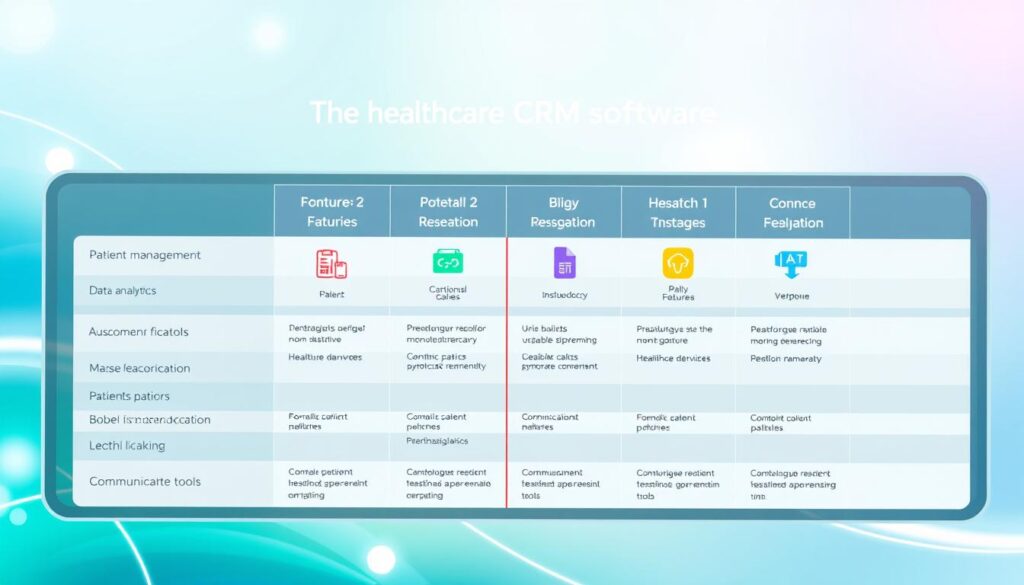
“Implementing a HIPAA-compliant CRM has been a game-changer for our practice. It’s allowed us to streamline our operations, boost patient engagement, and ensure the security of sensitive healthcare data.”
– Dr. Sarah Emerson, Medical Director, ABC Healthcare Clinic
1. Salesforce Health Cloud
Salesforce Health Cloud is a top-notch healthcare CRM solution. It has many features to help healthcare groups manage patient relationships better. It also makes operations smoother.
The platform gives a full view of patient info. This helps healthcare providers coordinate care better. It also boosts patient engagement and decision-making.
Overview and Key Features
Salesforce Health Cloud has some key features:
- Patient data management: It keeps all patient info in one safe place.
- Care coordination: It helps teams work together better. It makes care more personal.
- Analytics and reporting: It uses data to improve patient care and operations.
- Automation: It automates tasks to save time and money.
Integration Capabilities
Salesforce Health Cloud works well with many healthcare systems. This includes EMRs, patient portals, and other Medical Practice Software. It lets providers see all patient data easily.
This makes decision-making better and patient care smoother.
Pricing Structure
The cost for Salesforce Health Cloud starts at $300 per user per month. There are extra costs for advanced features and integrations. It’s flexible and can grow with any healthcare organization.
| Pricing Plan | Cost per User per Month | Key Features |
|---|---|---|
| Essentials | $300 | – Patient data management – Care coordination – Basic analytics |
| Professional | $450 | – Advanced analytics – Workflow automation – Customization tools |
| Enterprise | $600 | – Predictive analytics – AI-powered insights – Comprehensive integrations |
Salesforce Health Cloud is a strong Patient Relationship Management solution. It helps healthcare groups run smoother, engage patients better, and coordinate care well. Its flexibility and pricing make it a great choice for many healthcare providers.
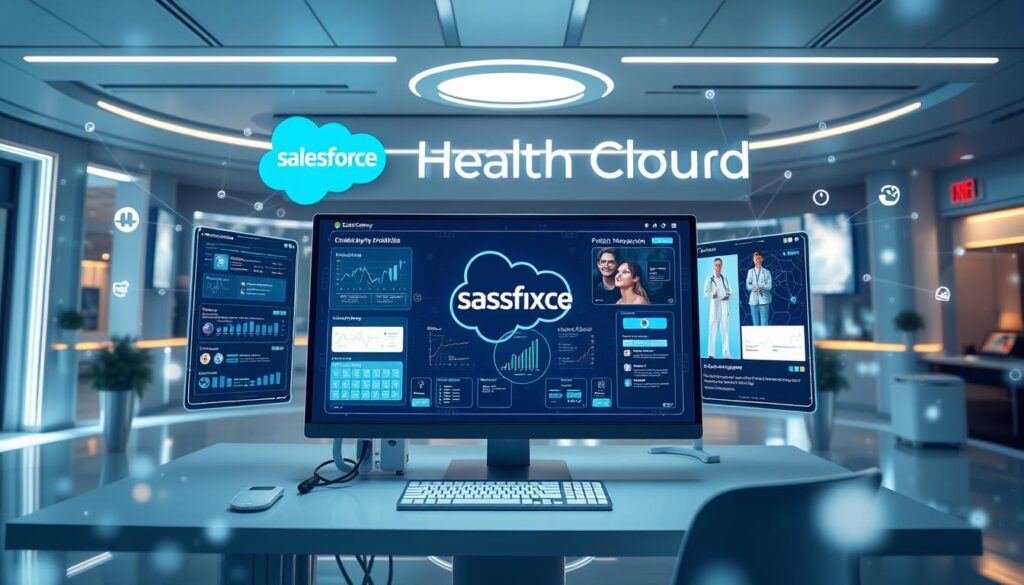
2. Zoho CRM for Healthcare
Zoho CRM for Healthcare is a top-notch CRM platform for the healthcare industry. It has many tools to help manage patients better, improve communication, and work more efficiently.
Overview and Key Features
Zoho CRM for Healthcare has many features to help patients and healthcare providers. It includes tools for managing patients, scheduling appointments, and marketing. It also works well with Electronic Health Records (EHR) systems. The platform is easy to use, even for those who are not tech-savvy.
Customization Options
Zoho CRM for Healthcare stands out because it can be customized a lot. Healthcare providers can change the platform to fit their needs. This makes it work better with their current systems, making everything more efficient.
User Reviews
Healthcare organizations love Zoho CRM for Healthcare. They say it’s easy to use, affordable, and great at integrating with other systems. It helps with patient interactions, automates tasks, and gives valuable insights.
| Feature | Description |
|---|---|
| Patient Management | Comprehensive patient records, appointment scheduling, and communication tools. |
| Marketing Automation | Personalized patient outreach, targeted campaigns, and lead management. |
| EHR Integration | Seamless integration with leading Electronic Health Records systems for streamlined data management. |
| Customization | Highly adaptable platform with the ability to configure workflows, dashboards, and reports. |
Zoho CRM for Healthcare is a great choice for healthcare organizations. It has lots of features, can be customized, and has good reviews. It’s perfect for improving Healthcare Customer Relationship Management and Electronic Health Records Integration.
3. Microsoft Dynamics 365 for Healthcare
Microsoft Dynamics 365 for Healthcare is a top tool for managing patient relationships and care. It makes healthcare work better and more efficient. It works well with other Microsoft tools and apps, great for all healthcare sizes.
Overview and Key Features
Microsoft Dynamics 365 for Healthcare has strong features for healthcare. It has HIPAA-compliant data management for safe patient info. It also has tools for patient insights, team work, and scheduling to make things smoother.
Scalability and Flexibility
This platform is great because it grows with healthcare needs. It works with Microsoft Cloud for Healthcare for more power. This cloud helps with data and AI, making healthcare better.
Azure AI helps make smart healthcare apps. Microsoft Teams makes team work better. This means healthcare can grow and keep patient care top-notch, all while following HIPAA rules.
| Key Feature | Description |
|---|---|
| HIPAA Compliance | Secure data management and storage that adheres to healthcare industry regulations. |
| Appointment Scheduling | Intelligent scheduling capabilities based on location, purpose, and patient preferences. |
| Patient Insights | Comprehensive patient data and analytics to drive personalized care and improve outcomes. |
| Care Team Collaboration | Seamless communication and data sharing among healthcare professionals. |
“Microsoft Dynamics 365 for Healthcare has been a game-changer for our organization, streamlining our operations and enhancing the overall patient experience.”
4. HubSpot CRM
HubSpot CRM is a powerful tool for healthcare providers. It helps improve patient engagement and care coordination. The free basic plan lets healthcare practices manage contacts, track emails, and schedule appointments.
HubSpot’s paid plans offer more features. These include marketing automation, detailed reports, and custom integrations. This makes it easy for healthcare organizations to meet their needs and work more efficiently.
Overview and Key Features
HubSpot CRM is easy to use and packed with features. It’s great for small to medium-sized healthcare practices. It has:
- Centralized patient data management
- Automated appointment scheduling and reminders
- Integrated email marketing and lead nurturing
- Detailed analytics and reporting dashboards
- Seamless third-party integrations
Pricing and Plans
HubSpot has flexible pricing for healthcare organizations. The free basic plan has the basics. Paid plans offer more advanced features:
| Plan | Price | Key Features |
|---|---|---|
| Free | $0 | Contact management, email tracking, appointment scheduling |
| Starter | $45/month | Marketing automation, custom reporting, custom integrations |
| Professional | $450/month | Advanced analytics, lead scoring, custom objects |
| Enterprise | $3,200/month | Dedicated support, custom onboarding, advanced security |
HubSpot CRM is easy to use and has great support. It’s a top choice for healthcare providers to improve patient engagement and care coordination.
5. Pipedrive
Pipedrive is a Revenue Cycle Management tool for sales. It helps healthcare practices manage leads, schedule appointments, and automate workflows. It’s easy to use, has customizable pipelines, and a mobile app for access anywhere.
It starts at $12.50 per user per month. This makes it a good choice for small healthcare providers to manage their Patient Relationship Management better.
Key Features
- Intuitive sales pipeline management
- Customizable workflows and automation
- Mobile app for remote access
- Affordable pricing starting at $12.50 per user per month
Unique Selling Points
Pipedrive stands out for its easy-to-use interface and customizable pipelines. It also has a mobile app for easy access. These features make it a top choice for healthcare providers looking for a Revenue Cycle Management solution.
| Feature | Benefit |
|---|---|
| Intuitive Pipeline Management | Streamlines the sales process and improves visibility into the Patient Relationship Management lifecycle. |
| Customizable Workflows | Allows healthcare practices to tailor the CRM to their unique Revenue Cycle Management needs. |
| Mobile App | Enables healthcare professionals to access and update patient information on-the-go. |
Pipedrive is a great choice for small to medium-sized healthcare practices. It’s easy to use, flexible, and affordable. It helps enhance Patient Relationship Management efforts.
6. SugarCRM
Healthcare groups looking for a flexible Medical Practice Software and CRM should check out SugarCRM. It starts at $19 per user per month. This makes it a great deal for healthcare needs.
Overview and Key Features
SugarCRM has many tools for managing patient relationships and automating tasks. It also has great reporting. Its open-source design lets users make big changes, perfect for big healthcare groups.
Ideal Use Cases
The healthcare world needs personal care and services. SugarCRM’s customization is perfect for this. Its pricing and flexibility are great for adapting to healthcare needs.
SugarCRM starts at $19 per user per month. It helps track interactions and personalize messages. Its customization and developer-friendly features make it a top choice for healthcare.
“SugarCRM’s customization capabilities make it a standout choice for healthcare providers looking to tailor their CRM software to their unique workflow and patient communication needs.”
Factors to Consider When Choosing a CRM
When picking a healthcare CRM, look at several important things. These include budget, how well it works with Electronic Health Records Integration, and how easy it is to use.
Budget Constraints
Healthcare groups have to watch their spending. The cost of a CRM is a big deal. They need to think about the initial cost and any ongoing fees.
It’s also important to see if the CRM will give them a good return on investment (ROI). This helps them know if it’s worth the money.
Integration with Existing Systems
Being able to work well with current EHR systems is key. It’s important for keeping HIPAA Compliance and giving patients a good experience. Look at how well a CRM can integrate with your systems.
User-Friendliness
Healthcare workers need to be able to use the CRM easily. It should have a simple interface and clear workflows. Also, good training is important for everyone to use it well.
By thinking about these points, healthcare groups can find a CRM that fits their budget. It should also work well with their systems and be easy for everyone to use.
“Effective patient engagement starts by understanding consumer behavior, communication preferences, logistical challenges, and personal goals.”
Conclusion: Finding the Right Healthcare CRM
The healthcare world is always changing. Getting the right CRM software can make a big difference. It helps with patient relationships, makes things run smoother, and improves how you manage your practice.
There are many great CRM options out there. This article talked about some top ones. Salesforce Health Cloud, Zoho CRM, Microsoft Dynamics 365, HubSpot, and Pipedrive are all great choices. They each have special features to meet different healthcare needs.
Summary of Best Options
Salesforce Health Cloud is a top pick. It has great patient engagement tools and can grow with your needs. It starts at $300/user/month.
Zoho CRM is known for its contact and lead management. It also has advanced scheduling and keeps patient info organized. Microsoft Dynamics 365 offers flexibility and is easy to use.
HubSpot CRM is highly recommended. It has tools to improve patient engagement and make things run smoother. It starts at $45/month. Pipedrive is also a good choice for healthcare providers. It’s easy to use and has unique features.
Next Steps for Implementation
Choosing the right CRM is important. You need to think about what your organization needs, your budget, and how it will work with your current systems. Try demos and trials to see how the software works.
It’s key to implement the CRM well. Make sure your staff knows how to use it. This will help your healthcare organization get the most out of it.




